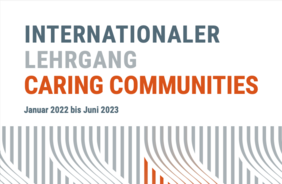A convivial society that enables a good life for everyone - with this goal in mind, people in many countries around the world are committed to a new social care culture. Many of you are already on your way. In neighborhoods, Grätzln and Kiezen, in districts, communities and villages, ideas, initiatives, and projects grow and flourish. They dedicate themselves to social interaction and experiment with new approaches to the topic of care, which is both a task and an opportunity for the future.
The International Course Caring Communities opens a space for these initiatives and their development. In this course everyone learns from one another. The participants receive inspiration from diverse contexts and (counter) movements and network internationally.
The main questions are: In which society do we want to live, love, work, grow old, deal with loss and illness and die? How can we ourselves, the organizations of the social and health system and politics promote solidarity-based lifestyles? What do we contribute to overcoming loneliness, injustice and social exclusion?
In six workshops and two public symposia there will be space for impulses, discussions, exchange and development.
You can find more information about this new course here (pdf) and at www.sorgenetz.at/ilcc.
Course team: Andreas Heller, Sonja Prieth, Patrick Schuchter, Robert Sempach, Klaus Wegleitner and Ilona Wenger
Organizer: Worry Network, Association for the Promotion of Social Care Culture and Migros Culture Percentage
In cooperation with: Cardinal König Haus Wien, Catholic Academy Freiburg, SCHLOSS HOFEN - Science & Further Education, Center for Interdisciplinary Research on Aging and Care (CIRAC) at the Karl-Franzens University Graz, Network Caring Communities Switzerland, Caritas Association of the Diocese of Rottenburg- Stuttgart eV (DICV), University of Applied Sciences Northwestern Switzerland / University of Social Work FHNW.
Language: German
